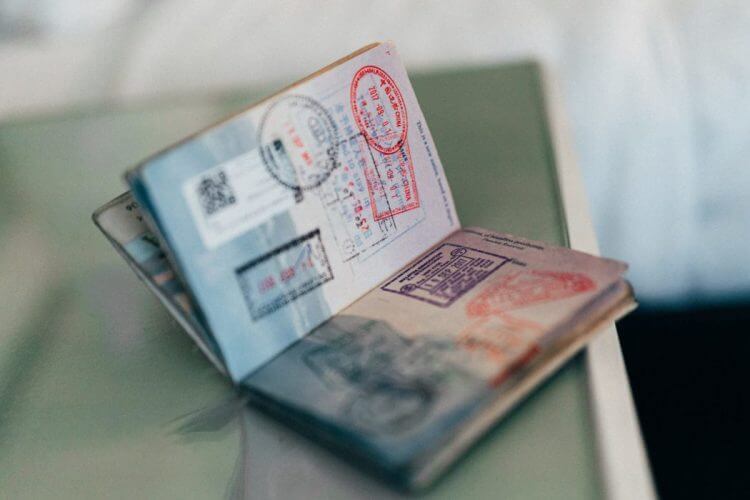In today’s world, many jobs can be done from anywhere just with a decent wifi connection and a laptop. Working remotely in France for a company based in the USA, the UK or anywhere else in the world really becomes possible, but there are a few things to consider.
While modern technology and our new work reality with the pandemics make it possible for many professionals to work from anywhere, there are some important aspects to consider like residency, work permits and tax implications before you make the jump.
So, I will tell you how to work remotely in France and I’ll even give you 5 solutions but before that, let me share with you the 2 mistakes that most people make when planning to freelance in France or from France.
Table of Contents
The two mistakes most people make when planning to work remotely in France?
Come with a 3-month visitor visa hoping to extend
First, you should know that you can not extend or transfer your short-stay visitor visa to any other status (except for the French spouse visa but this is another topic).
So, if you come to France with a 3-month visitor visa or if you are part of the nationalities that are exempt from requesting an entry visa for stays under 90 days, you will NOT be able to stay longer than 3 months or request any visa from France.
So if you are a digital nomad, a blogger, Instagram influencer doing any kind of short-term tech-based work from France for under 3 months, you’ll be fine.
But if you want to stay longer in France, your only option will be to go back home and request the relevant long-stay visa (which I’m gonna detail in the second part of this post).

Come with a long-stay visitor visa hoping to change status
The tax issue
There is no France digital nomad visa as such. But if you are planning to stay more than three months in France many remote workers opt for the long-stay visitor visa! And this can put you into trouble! And the main reason is that there is a big chance you will not be compliant from a tax point of view.
Be aware, that if you are on a long-stay visitor visa, you are not going to be able to pay for social contributions since you don’t have the right visa to register a business and work in (or from France). Because what matters for the tax office is in which country you are sitting to do the job, not where your clients are. But if you need more guidance on tax implications and bilateral agreements, your go-to persons should be either the tax office or a tax advisor.
The immigration issue
Also, one of the documents that you need to provide as part of your long-stay visitor visa request, is a sworn attestation certifying that you will not be looking for a job or work in France during your long-stay visitor visa validity.

The change of status issue
You should know that if you try to switch status (so in that case from a long-stay visitor visa to one of the entrepreneur visas) within the first year (so before it is due for renewal), the Prefecture will question your initial intention to request your first visa and your initial motive to move to France.

When the long-stay visitor visa could be an option to work remotely
Having the above information in mind, you can use this first year in France under a visitor long-stay visa to prepare your entrepreneurial project, make contacts, and accumulate prospects for example. But you will not be able to invoice and pay the corresponding taxes to the French government under a tourist long-stay visa.
So, if this is your plan to change status at the end of your first year – 2 months before expiration (as opposed to before your visa is due for renewal), do not think that it’s gonna be easier than requesting the visa from the French consulate outside France. This is exactly the same!
The same initial documents will be requested plus some extra ones to justify your stay in France for the first year.
So what’s the best strategy?
So, if your initial intention is to work from France from the start, requesting a visa that really matches your plans is the way to go.
Also, WATCH OUT as you may receive other information from the French consulate. The consulate will answer from an immigration point of view and not the tax point of view. So, you might get the visitor’s long-stay visa and then would not be compliant from a tax point of view. Which is something you want to avoid, especially if you are planning to stay in France for more than a year.
Working remotely in France: How to do it if you are a freelancer or a contractor?
So you understood that if you want to stay in France for more than a year, coming to France as a freelancer under a long-stay visitor visa can put you at risk with the French tax office.
Now, there are several visas that will allow you to run your business in France as the main reason. It will be:
- first the Entrepreneur Profession liberale visa: this is my favourite one since it is the easiest one to get.
I usually recommend the next 3 ones if you are moving to France with your spouse because the Profession liberale visa doesn’t grant a spouse visa whereas all the Talent passport ones do. So, the 3 talent passport visas possible for entrepreneurs, freelancers or self-employed are:
- the Talent passport entrepreneur – of course
- then, the Talent passport artistic profession
- and the Talent passport – innovative business project which is part of the French tech programme

You may have noticed that there is no Digital Nomad visa as such in France. So these are the 4 options available in 2022 as I write this post.
These are actually the 4 visas that I detail in my France Formula online course. In the course, I go into a lot of detail so that you know which of these visas matches your situation, and how to prepare the visa request file, I even give a business plan template, and, of course, everything that you have to do in terms of red tape once in France.
I open the doors to this course only about 3 times a year so that I can focus on the students, so, if you want to know more about this course and want to be informed of the next opening, you can sign in to the waiting list via the link in the box below.
We will now see the situation for salaried employees, then I quickly touch on the tax implications and finally give you 5 solutions to work remotely in France.
Working remotely in France: How to do it if you are a salaried employee of a company based outside of France (and with a non-French work contract)
A common question I get:
I’m working for a British, Australian or US company. Can I keep my employment and work remotely from France on a visitor visa since I will not be looking for employment in France?
A simplified answer is NO.
If you are working for a foreign company but you are physically based in France, your employer needs to follow the French Labour Law and they are responsible for you to have the right visa and permit to work in or from France.
They will also need to pay for the corresponding social charges in France. But, as I said before, you will get away with it if you come to France for less than 12 months and also it will depend on the tax bilateral agreement between your country and France. So, you should first contact a tax lawyer to see where you will be taxable and only then the visitor visa might be an option.
Working remotely in France: the tax implication
If you live in France and work in France, you are a tax resident. This means that you pay social contributions in France.
There are several criteria to determine tax residency, the main ones the tax office will look at are:
- Where are your economic interests?
- Where is your family (spouse and children) located?
- Are you staying more than 183 days in a fiscal year in France?
If you have a one-year visa or permit, you are a tax resident. And the tax treaty between France and your country determines where your income should be taxed and this includes your income and your worldwide assets.
This means that according to both your country’s law and French law your worldwide income may need to be declared in France and depending on the amounts declared you will need to pay the corresponding social contribution and income tax on those incomes and assets.
When you reside in France, you have to file a tax return. Declaring your income doesn’t necessarily mean that you will have to pay taxes, but this is a compulsory process that you need to go through.

The solution to working remotely in France
In short, it will be to get the visa that really matches your initial intention to move to France. Coming with an easy visa could make your life more complicated and put you at risk.
Solution #1
So if you are a freelancer, it will be one of the 4 visas I’ve mentioned that I detail in my online course.
Solution #2
If you are coming for less than a year as a self-employed or if you will not be invoicing any clients for the first year, the long-stay visitor visa will be sufficient
Now for the employees, first you should know that even if this is your choice to move to France, your employer should still be compliant. I will list here the 3 main solutions. So that brings us to
Solution #3
You could be transferred to your current employer’s French office either with a French work contract or as a seconded employee. There is a specific visa for each situation. The seconded – Intra Company Transfer visa (called visa Salarié détaché in French) and also the Expatriate assignment visa (called visa Salarié en mission).
Solution #4
If your employer does not want to go through the relevant visa sponsor process and immigration process you still have the option to work as a contractor for your ex-employer and therefore request one of the 4 entrepreneur visas that I’ve listed before.
So this means that you will have to create a French-based company structure and for that, I invite you to reach out to an accountant.
Solution #5
Your employer could also use the service of a “portage salarial” company, as an umbrella company. This means that a 3rd party company based in France will contract you under a French work contract on behalf of your original employer. You would still need to have a work visa to be able to work in France. Using the services of an umbrella company can be an expensive option that companies usually take when they are sending someone on a short-term basis and they don’t have a French office or when they want to create a French branch.
In short
- If your plan is to come to be working remotely in France for under 3 months, you will likely get away with working under a tourist visa, even if this is not the recommended and compliant option.
- Always request the appropriate work visa if you plan to work in France or from France for more than three months.
- Get advice from a tax lawyer to understand the tax implications and applicable bilateral agreement between your country and France
- And finally, get the assistance of a chartered accountant to choose the right set-up for your company in France.




12 Comments
Lucile
Thank you so much for taking the time to reply to these individual comments, your article is so helpful. My situation is similar to Shaun’s above, in that I have a French passport and work for a UK company. However, I want to relocate for just the one year and that would be a school year (so across two tax years) with regular trips back to the UK for office days. Would that make me exempt from French tax? If it were less than 183 days in each tax year? Thanks again for all this advice.
Mademoiselle Guiga
Hi Lucile,
You’ll need to contact a tax lawyer to have personalised tax information, I’m afraid.
Good luck to you!
Dominika
Hello,
Could you please advise what would be the best approach for the Italian citizen to work remotely from France (for up to 3 weeks)? The employee is hired in German company and there is a company’s legal entity in France, however, would that be possible to work remotely without changing the German contract? What are the options and what would be the risks for the company?
I would be grateful for your advice – all the best in the New Year!
Mademoiselle Guiga
Hi Damonika,
From an immigration point of view, you don’t need to do anything to come and work remotely from France whatever the duration.
Then, the 2 main impacts I can think about would be in terms of tax residence and also your employer’s professional liability insurance. You need to have approval from them to be covered abroad. Also, an addendum to the contract is always possible and would protect both the employer and the employee.
Best to you,
Emily Dolan
I am a Canadian citizen, waiting for my UK Visa to be approved, and working for a UK company. I cannot work remotely from Canada, due to it being a commonwealth, so if I were to stay in France with a friend to be closer to the office, would I be able to work remotely from France with a visitor visa? (My stay would only be 8 weeks)
Thank you!
Mademoiselle Guiga
Hi Emily,
The immigration question and the tax implication are two different things.
You can come to France for 8 weeks and work remotely under the visa exemption (or short-stay tourist visa for other nationalities). Then you may also need to get your employer’s authorisation for compliance & insurance purposes.
Then, which country you are staying in for the rest of the tax year may impact your tax residence. But this is something you should consult with a tax advisor.
Best,
Stephanie Moss
We are a married British couple, currently living and working in England.
In 2015 we purchased a small house in France, which we have been slowly renovating, as and when we can afford to do the work.
With the work on the house nearly completed, and our only child now attending University, we are thinking about spending more than just our usual 1-2 week holidays, 3 or 4 times a year, at the French house.
As we are both able to work remotely, would we be allowed to visit France for a few months at a time, but work for our UK companies from our French house? If possible, we would look to regularly repeat the arrangement for the next 3 years, until we eventually retire to France.
Mademoiselle Guiga
Hi,
The easiest from an immigration point of view would be to use the 90 days over 180 Schengen rules and come under the short stay visitor status.
However, I highly recommend you consult a tax advisor since your travel back and forth may have tax implications.
Owning a property in France doesn’t grant any specific immigration advantages or simplifications.
The only difference would be if you were to request a long-stay visitor visa, the amount of money to show would be lower since you have a property you own.
More information on the Visitor long-stay visa here: https://expat-in-france.com/france-long-term-visa/
I hope this helps.
Best,
Shaun Scott
Great article, what about if you are an EU citizen working for a UK company remotely and plan to live in France for 5 years?
Mademoiselle Guiga
Hi Shaun,
As an EU citizen, all the immigration aspects will not apply.
However, all the tax ones will.
It would be the same for a French citizen working for a UK company under a UK contract, and wanting to repatriate to France keeping the UK contract. Residing in France, you will need to declare taxes in France, and pay social contributions from the moment you become a French tax resident. Best,
Antonia Morzenti
Hello! Thanks for writting all of this up, its very sound advice. What solution(s) would you recommend for someone who…
– has a long stay visa with the right to work (I’m married to a french person)
– is employeed by a US company (salaried) with no offices in France
– plans to do this long term
Thanks in advance!
Mademoiselle Guiga
Hi Antonia,
Solution #4 and #5 of this article will apply to you.
I advise you to reach out to a tax advisor as well since in your case, the only issue is the tax issue. Not the immigration since your long-stay Vie privee et familiale visa will give you the right to work in France.
Best to you